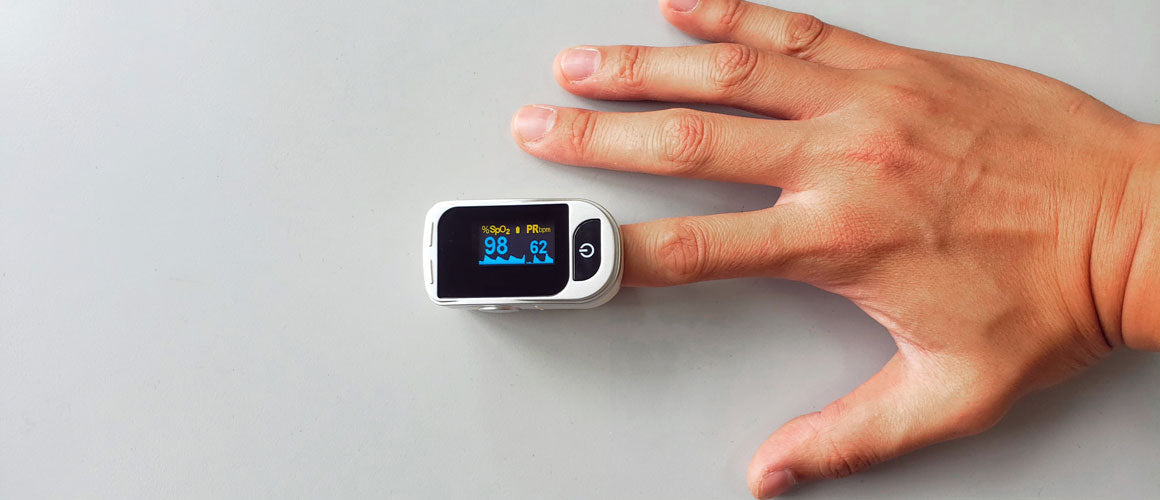Estimated reading time: 3 minutes
Pulse oximeters for the elderly
You may have read or heard recently of pulse oximeters and how they are being used to monitor the health of people with coronavirus (COVID-19). In fact, the NHS use pulse oximeters to the detect early deterioration of patients with coronavirus.
What is a pulse oximeter?
A pulse oximeter is small device that clips onto your finger and measures your pulse rate, as well as how much oxygen is in your blood.
Why would you want or need a pulse oximeter?
It has been reported that oxygen levels can drop significantly to dangerously low levels in people with coronavirus. You may not realise your oxygen levels have decreased and may not even feel unwell or show other symptoms.
A low blood oxygen level is a useful early indicator of ‘silent hypoxia’ (low oxygen levels in the absence of significant shortness of breath).
Finger Pulse Oximeter
The Kinetik Wellbeing Pulse Blood Oxygen Monitor is completely pain-free and simple to use. It is compliant with European medical device regulations and so rest assured it is a quality product.
How can a pulse oximeter help an older adult?
If you are elderly or considered high risk from coronavirus, a pulse oximeter could benefit you by monitoring your oxygen levels.
Oxygen saturation levels vary considerably based on a person’s health and older adults will typically have lower oxygen saturation levels. It’s reported that a normal oxygen level in the blood is between 95% and 100% but it is said that people admitted to hospital with coronavirus tend to have oxygen levels of around 70 – 80%.
A pulse oximeter could be helpful and potentially lifesaving, particularly for those who are more vulnerable to the coronavirus, as they can be admitted to hospital earlier and before their levels drop to a dangerously low level.
Why are oxygen levels important?
Your blood oxygen level is the amount of oxygen circulating in your blood. Low blood oxygen levels may indicate an issue with your lungs or circulation.
A pulse oximeter cannot detect coronavirus but it can help you monitor your general health and signs associated with the virus. NHS England advise that if you experience any of the following coronavirus (COVID-19) symptoms, you should contact 111 as soon as possible.
- Feeling breathless or difficulty breathing, especially when standing up or moving
- Severe muscle aches or tiredness.
- Shakes or shivers.
- If you use a pulse oximeter, your blood oxygen level is 94% or 93% or continues to be lower than your usual reading where your normal oxygen saturation is below 95% (re-take a reading within an hour first).
- Sense that something is wrong (general weakness, severe tiredness, loss of appetite, peeing much less than normal, unable to care for yourself – simple tasks like washing and dressing or making food).
How does a pulse oximeter work?
To use a pulse oximeter, you place your finger inside the device and within a few seconds a complete reading of your oxygen levels is given. This should be done throughout the day at regular intervals.
They are clever little devices that actually use light to measure oxygen levels in blood. A sensor measures the absorption levels of specific wavelengths of light found in oxygenated haemoglobin compared with reduced haemoglobin. An LED transmits the light wavelengths from one side of the finger to the photodetector sensor on the other side of the finger. The level of oxygen in the blood determines the amount of light absorbed.
How much does a pulse oximeter cost and should you buy one?
For the elderly, vulnerable and those prone to respiratory failure or who suffer from a chronic respiratory condition, a pulse oximeter may be a useful device but does not replace professional medical advice.
Whilst pulse oximeters have been common medical devices since the 1970s, used incorrectly they can give false readings and as with many products related to coronavirus, demand and price has soared. A pulse oximeter can cost around £30 and you should be wary of less reputable online sellers selling pulse oximeters at high prices. All approved medical devices in the UK should carry the CE mark.
How else can you stay safe and get help?
If you are feeling anxious about isolating and how you may get help in an emergency, then a personal alarm pendant or elderly fall alarm is worth considering. These are commonly worn around the neck or wrist and have an easy to use emergency button to press. This connects you to an alarm monitoring centre who can get help to you in an emergency, such as if you feel unwell, are in distress or have a fall.





